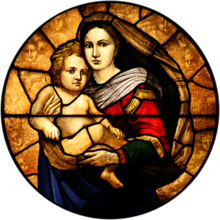Mariolojia ya Kiprotestanti

Mariolojia ya Kiprotestanti inajumlisha mitazamo mbalimbali ya theolojia ya madhehebu ya Kikristo ya Kiprotestanti na viongozi wake wa zamani kama vile Martin Luther na Yohane Calvin na wataalamu wa baadaye kuhusu Bikira Maria, Mama wa Yesu.
Waanzilishi
[hariri | hariri chanzo]
Baadhi ya waanzilishi wa Uprotestanti kama Martin Luther[1] na Huldrych Zwingli[2] walimheshimu Bikira Maria.
Kabla yao, John Wycliffe alikuwa na msimamo wa namna hiyo [3].
Kwao suala lilikuwa si heshima kwake, bali kiwango cha kufaa cha heshima hiyo[4][5].
Zaidi ya hayo, Martin Luther alishikilia dogma kuhusu Maria kwamba ni Bikira daima na anaweza kuitwa Mama wa Mungu[6] Tena alitetea mtazamo kwamba alikingiwa dhambi ya asili, au walau aliishi bila dhambi. [7]
Karl Barth
[hariri | hariri chanzo]Karl Barth (1886–1968), mwanateolojia maarufu wa Wareformed, alishika msimamo kama wa Martin Luther[8][9]
Hali ya sasa
[hariri | hariri chanzo]Hadi sasa Shirikisho la Kimataifa la Walutheri linakubali kumuita Maria "Mama wa Mungu"[10].
Vilevile Ushirika wa Anglikana unashika mafundisho hayo ya mapokeo yaliyotolewa na mitaguso ya kiekumeni na kumheshimu Bikira Maria kuliko namna inavyokubaliwa na baadhi ya Waprotestanti, hasa ya madhehebu yaliyoanzishwa Marekani katika karne za mwisho[11][12]
Tanbihi
[hariri | hariri chanzo]- ↑ {{the honor given to the mother of God has been rooted so deeply into the hearts of men that no one wants to hear any opposition to this celebration... We also grant that she should be honored, since we, according to Saint Paul's words [Romans 12] are indebted to show honor one to another for the sake of the One who dwells in us, Jesus Christ. Therefore we have an obligation to honor Mary. But be careful to give her honor that is fitting. Unfortunately, I worry that we give her all too high an honor for she is accorded much more esteem than she should be given or than she accounted to herself. Cfr. Basely, Joel R. (2005). Festival Sermons of Martin Luther. Dearborn, Michigan: Mark V Publiscations. uk. 167. ISBN 0-9652403-1-2. Iliwekwa mnamo Machi 24, 2015.
{{cite book}}: CS1 maint: date auto-translated (link) - ↑ "I esteem immensely the Mother of God" and "The more the honor and love of Christ increases among men, so much the esteem and honor given to Mary should grow".
- ↑ "It seems to me impossible that we should obtain the reward of Heaven without the help of Mary. There is no sex or age, no rank or position, of anyone in the whole human race, which has no need to call for the help of the Holy Virgin." Cfr.
 "Devotion to the Blessed Virgin Mary". Catholic Encyclopedia. New York: Robert Appleton Company. 1913.
"Devotion to the Blessed Virgin Mary". Catholic Encyclopedia. New York: Robert Appleton Company. 1913.
- ↑ Luther's Works, 47, pp. 45f; see also, Lutherans and Catholics in Dialogue VIII, p. 29.
- ↑ John Calvin. "On John 2:1–11". Commentary on John. Juz. la 1. Iliwekwa mnamo 2008-05-19.
- ↑ Remigius Bäumer, Marienlexikon Gesamtausgabe, Leo Scheffczyk, ed., (Regensburg: Institutum Marianum, 1994), 190.
- ↑ Bäumer, 191
- ↑ Barth, Kirchliche Dogmatic I, 2, 219
- ↑ "Where ever Mary is venerated, and devotion to her takes place, there the Church of Christ does not exist" (Church Dogmatics, I, 2, 154). "Catholic mariology is a cancer, a sick theological development, and cancers should be cut out" (Church Dogmatics, I, 2, 153). "The heresy of the Catholic Church is its mariology and Marian cult." (Church Dogmatics, I, 2, 157).
- ↑ "The Ecumenical Councils and Authority in and of the Church", 7th Plenary of the Lutheran-Orthodox Joint Commission in Sandbjerg, Denmark (PDF), The Lutheran World Federation, 10 Julai 1993, ilihifadhiwa kwenye nyaraka kutoka chanzo (PDF) mnamo 2020-11-12, iliwekwa mnamo 2022-08-28
{{citation}}: CS1 maint: date auto-translated (link) - ↑ The Everything Jesus Book: His Life, His Teachings by Jon Kennedy 2006 ISBN|1-59337-712-6 page 7
- ↑ Walsingham in Literature and Culture from the Middle Ages to Modernity by Dominic Janes, Gary Fredric Waller 2010 ISBN|0-7546-6924-6 pages 12–13
Viungo vya nje
[hariri | hariri chanzo]- Protestant Mary Archived 10 Machi 2013 at the Wayback Machine., Religion and Ethics Newsweekly report
- A Warm Protestant Welcome for Mary, from US News and World Reports
- Mary, Luther and Lutheranism, from the Lutheran Church–Missouri Synod
- Michael J. Penfold. “Christ, of the Substance of Mary” – A History of the Defence of the Doctrine. https://www.webtruth.org/the-person-of-christ/christ-of-the-substance-of-mary-a-history-of-the-defence-of-the-doctrine/#_ftnref38
- Sermon on Mary, The Pure Mother of God, 1520, Huldrych Zwingli.

